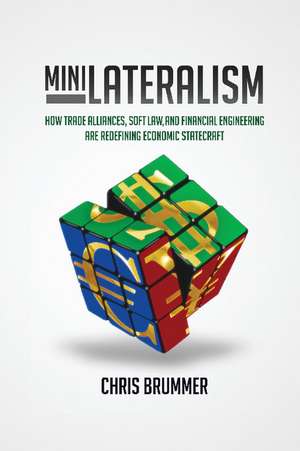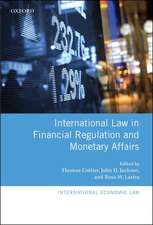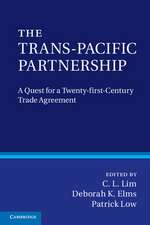Minilateralism: How Trade Alliances, Soft Law and Financial Engineering are Redefining Economic Statecraft
Autor Chris Brummeren Limba Engleză Paperback – 6 apr 2014
| Toate formatele și edițiile | Preț | Express |
|---|---|---|
| Paperback (1) | 278.71 lei 6-8 săpt. | |
| Cambridge University Press – 6 apr 2014 | 278.71 lei 6-8 săpt. | |
| Hardback (1) | 497.99 lei 6-8 săpt. | |
| Cambridge University Press – 6 apr 2014 | 497.99 lei 6-8 săpt. |
Preț: 278.71 lei
Nou
Puncte Express: 418
Preț estimativ în valută:
53.33€ • 55.68$ • 44.14£
53.33€ • 55.68$ • 44.14£
Carte tipărită la comandă
Livrare economică 04-18 aprilie
Preluare comenzi: 021 569.72.76
Specificații
ISBN-13: 9781107678569
ISBN-10: 1107678560
Pagini: 224
Ilustrații: 4 b/w illus. 3 tables 1 exercise
Dimensiuni: 152 x 227 x 14 mm
Greutate: 0.39 kg
Ediția:Nouă
Editura: Cambridge University Press
Colecția Cambridge University Press
Locul publicării:New York, United States
ISBN-10: 1107678560
Pagini: 224
Ilustrații: 4 b/w illus. 3 tables 1 exercise
Dimensiuni: 152 x 227 x 14 mm
Greutate: 0.39 kg
Ediția:Nouă
Editura: Cambridge University Press
Colecția Cambridge University Press
Locul publicării:New York, United States
Cuprins
Introduction: rethinking cooperation in a multipolar world; 1. Multilateralism's rise and fall; 2. Playing the numbers in trade; 3. Soft law in international finance; 4. Hedging bets in the monetary system; 5. Managing minilateralism.
Recenzii
'Chris Brummer's core message is that multilateralism is giving way to minilateralism. As the era of American hegemony draws to a close and as the institutions that once dominated the multilateral era (the WTO, the World Bank and the IMF) find themselves constrained by a more complex environment, new institutions and smaller networks are developing, much as the first small, furry mammals quietly appeared at the end of the Age of Dinosaurs. Brummer incisively connects the dots between financial, trade and monetary regulation, charting the growth of these new bodies … This is an eye-opening and elegantly written tour, as history and economics interact, new institutions evolve, and soft law seeks to hold the new networks together.' John C. Coffee, Jr, Adolf A. Berle Professor of Law and Director, Center on Corporate Governance, Columbia Law School
'Chris Brummer has brought several seemingly disparate trends in the global financial system together under the useful umbrella of minilateralism. In doing so, his lively and engaging writing style gives life to the details of global governance and financial engineering. Most importantly, however, instead of just celebrating the new status quo, he identifies minilateralism as a response to globalization that when improperly managed can create as many problems as it solves.' Anne-Marie Slaughter, President and CEO, New America; and Bert G. Kerstetter '66 University Professor of Politics and International Affairs, Princeton University
'Professor Brummer ably captures the recent evolution from standard-setting and consensus building via large, multilateral institutions promoting universalist principles, to norms established via smaller coalitions focused on addressing the particularist needs of like-minded partners. Few books tackle so many topics so clearly and elegantly, and bundle them into one compelling narrative. Moving from the regulation of coins in medieval Europe to today's international money supply and the rise of the Chinese RMB, and from Venetian trade strategy to today's WTO, Minilateralism offers a compelling history and theory of how economic diplomacy works. For standard-setters looking to understand their role in the global economy, a must read from a top expert in the field.' Ethiopis Tafara, Vice President and General Counsel, International Finance Corporation, World Bank Group
'Chris Brummer has brought several seemingly disparate trends in the global financial system together under the useful umbrella of minilateralism. In doing so, his lively and engaging writing style gives life to the details of global governance and financial engineering. Most importantly, however, instead of just celebrating the new status quo, he identifies minilateralism as a response to globalization that when improperly managed can create as many problems as it solves.' Anne-Marie Slaughter, President and CEO, New America; and Bert G. Kerstetter '66 University Professor of Politics and International Affairs, Princeton University
'Professor Brummer ably captures the recent evolution from standard-setting and consensus building via large, multilateral institutions promoting universalist principles, to norms established via smaller coalitions focused on addressing the particularist needs of like-minded partners. Few books tackle so many topics so clearly and elegantly, and bundle them into one compelling narrative. Moving from the regulation of coins in medieval Europe to today's international money supply and the rise of the Chinese RMB, and from Venetian trade strategy to today's WTO, Minilateralism offers a compelling history and theory of how economic diplomacy works. For standard-setters looking to understand their role in the global economy, a must read from a top expert in the field.' Ethiopis Tafara, Vice President and General Counsel, International Finance Corporation, World Bank Group
Notă biografică
Descriere
This book explains how minilateral strategies work and how this new diplomatic toolbox will reshape how countries do business with one another.










